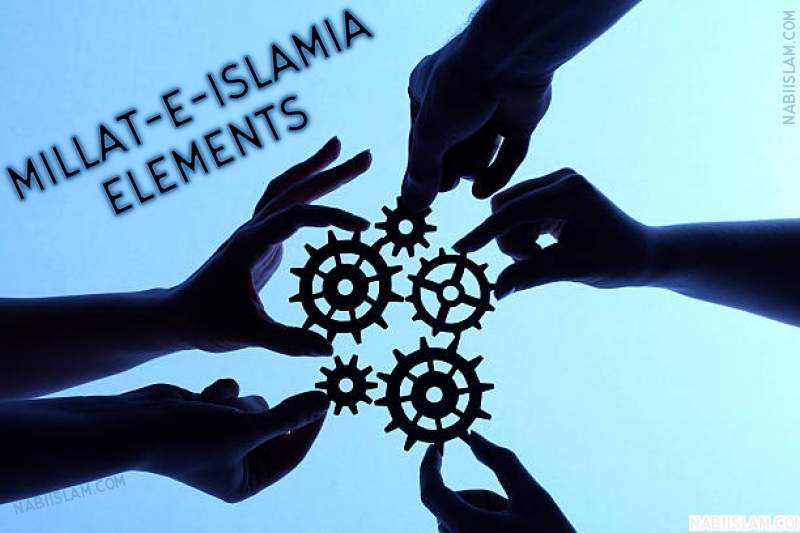Unity of Muslim Ummah.
There are 51 autonomous Muslim states around the globe, totalling around 1000 million people, or 25% of the world’s population. The remaining third of this group, which is independent, resides in non-Muslim nations. The United Nations Organisation has 46 member among these governments.
Muslim Countries;
| Yemen | Upper Volta | Algeria |
| Cameroon | Democratic Central Africa | Democratic Chad |
| Dahomi | Ethiopia | Guinea |
| Iraq | Iran | Ivory Coast |
| Jordan | Kuwait | Libya |
| Malaysia | Bangladesh | Maldive Island |
| Mali | Mauritania | Morocco |
| Niger | Nigeria | Pakistan |
| Saudi Arabia | Senegal | Sierra Leone |
| Somalia | South Yemen | Sudan |
| Syria | Tanzania | Togo |
| Tunisia | Turkey | United |
MILLAT:
The members of a group who practice the same religion are referred to as Millat. The Millat-e-Islamia includes all individuals who identify as practicing Islam as their primary religion and who reside wherever in the world. Caliph Suleman of Tur (1520–1566) was the first to establish the idea of Millat. Suleman was the legendary caliph of the Ottoman Empire in Turkey at the time.
The Millat also includes aspects of the populace’s cultural life. Despite the fact that religion is a component of Millat-e-Islamia, it also covers the social and cultural life of Muslims. If we include Islamic culture in Islamic society, we have Millat-e-Islamia.
Islamic culture +Muslim societies +Millat-e-Islamia.
Due to Islamic culture, the Muslim population of the entire globe forms a community known as Millat-e-Islamia. Islamic culture unites all Muslims worldwide, and it serves as the foundation of Millat-e-Islamia.

MILLAT-E-ISLAMIA ELEMENTS
The Millat-e-Islamia is a distinct, extensive entity. The following list outlines the components of Millat-e-unity: Islamia’s
Tauhid:
All of the Muslims who are a part of Millat-e Islamia uphold the Oneness of Allah and engage in combat with the demonic forces that oppose Tauheed.
Risalat:
All Millat-e-Islamia Muslims acknowledge, at long last, that Muhammad (SAW) is one of Allah’s messengers and that His Shariah is lawful for us. They oppose all forces that reject the Holy Prophet’s prophethood (SAW).
Protecting the Deen:
The Millat-e-Islamia defends the Islamic shrines and the Holy Quran from evil influences. Additionally, the Millat attempts to spread the teachings of Muhammad (SAW) to both believers and non-Muslims.
Defending the nation:
The Millat attempts to protect the area in which it lives, and for this reason, the members give up both their lives and their financial resources. Jihad is the name given to this conflict for state defense.
Defense of Islamic Shrines:
It is the responsibility of Millat-e-Islamia to protect Islamic shrines such as Baitullah, Masjid Nabvi, Masjid Al-Aqsa, and the Holy Prophet’s (SAW) Mausoleum, and all other sacred objects.
Islam preaching:
It is the duty of every Muslim in the world to spread the Deen of Allah to everyone, wherever they may be. Using one’s tongue, pen, and wallet, one can do this task. Anyone who opposes the spread of Islam can be violently combated.
Cultural Solidarity:
People in Muslim societies have the ability to band together to form a powerful Millat that may be founded on cultural solidarity. Because all Muslim societies around the world share a common culture relating to religious values, ideas, and customs related to the Islamic way of life, belief in Tauheed and Risalat, as well as life after death, is widespread. Additionally, this establishes a basis for cultural solidarity among Muslim societies.
Modern Technology and Industry:
Millat-e-Islamia is only able to exist on this planet if it reaches the pinnacles of modern industry and technology. Considering that moral values cannot be opposed by material ones. The atomic and modern electronic approach is crucial for culture. Islam’s honorable existence of Millat-e-Islamia is reflected in Islamic culture. We must protect ourselves against the adversaries of Islam as we live in a hostile environment. Only until modern technology and industry are efficient and self-sufficient will this be possible.
The Islamic Court of Justice
Most of the issues the Millat-eISimia face are a result of their shared culture. because the majority of the clashes involve their predominantly Muslim neighbors. Such disputes can be resolved by an Islamic Court of Justice, a special court established only for Muslim states. A court like this could settle issues like the conflict between Iran and Iraq. The Islamic Court of Justice, which requires its execution, was given this name at the third Islamic conference of Muslim heads of state, which took place in Taif in January 1981.
The Organization of Islamic Conference (OIC) was established by the Muslim Ummah to discuss and address the issues the Ummah was facing. This office just decided that India should rebuild the Babri Mosque where it was destroyed and desecrated by fanatical Hindus. Once more, the Muslim Ummah organization decided and reminded the UN that Bosnian Muslims should be protected from Serb butchery and that Bosnia’s independence should be ensured. Please, click on AQAcademy11.com if you want to learn more about Islam and World.
Unity of Muslim Ummah Unity of Muslim Ummah Unity of Muslim Ummah Unity of Muslim Ummah Unity of Muslim Ummah Unity of Muslim Ummah Unity of Muslim Ummah
